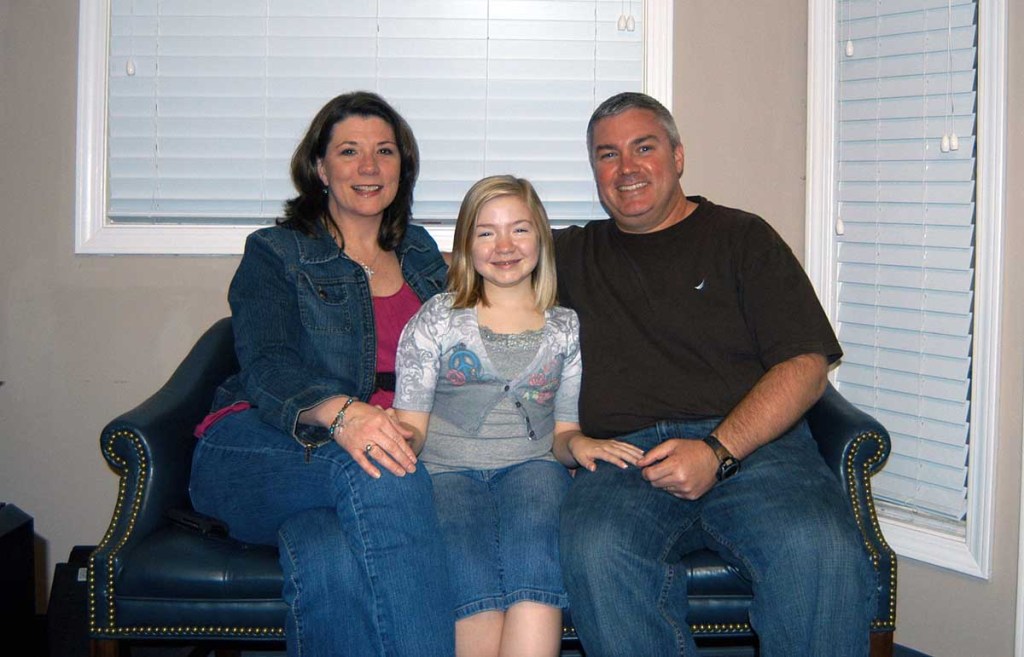Morris girl receives kidney donation from father
Published 3:48 pm Wednesday, April 6, 2011

- Hannah Crell, 11, recently received a kidney from her father, Wade. From left is Katrina, Hannah and Wade Creel.
Wade and Katrina Creel are moved to tears when they discuss the events of their daughter’s life.
Hannah Creel, 11, had a kidney transplant on March 10. She received the kidney from her father.
Hannah was diagnosed with cystinosis, a rare genetic kidney disease, when she was 18 months old. There are only about 2,000 known cases of cystinosis in the world, according to a spokesperson with the Cystinosis Research Network.
Wade and Katrina are both carriers of the recessive gene, but did not know it until Hannah received her diagnosis.
Wade said it was never the family’s plan for him to give a kidney; Katrina had decided she would donate to her daughter when the time came.
“We’ve basically known it was coming for nine and a half years,” Wade said about the kidney transplant.
He said doctors will not test family members as potential donors until a patient goes into kidney failure. Wade was as surprised as everyone else when he proved to be a more qualified donor.
Katrina scored six out of 10, which was “good enough,” Wade said. But he scored an eight out of 10.
“They said that rarely ever happens,” said Wade.
After the testing, there was no question for Wade that he would donate a kidney to his daughter. Her own two kidneys are still intact; the family said doctors like to leave the original organs if possible. They will eventually atrophy on their own.
Doctors placed Hannah’s new kidney under her liver, on the right side of her body.
Before the transplant, Hannah was easily fatigued. She often fell asleep in class and got easily winded during PE. She had to wash her hands often and stay away from sick people.
Only three weeks after the transplant, Wade is thrilled that his daughter, for the first time ever, has more endurance than he does. “Finally, she’s like the 11-year-old and I’m like the 42-year-old,” he said with a laugh.
“It’s like it’s supposed to be now,” Hannah said. “I like it being like it’s supposed to be.”
Wade and Katrina said many people have embraced Hannah and have supported the family in countless ways. One of her doctors, Dr. Mark Benfield, of Pediatric Nephrology of Alabama, along with his wife Michelle, have especially been supportive, Wade said.
Hannah’s school, Bryan Elementary, has also worked closely with the family to help care for Hannah, especially principal Debra Campbell and school nurse Amanda McCrary.
“Nurse Amanda is my school mom,” Hannah said. “She knows everything I love to eat and she knows all my medications.”
Katrina, who works in the lunchroom at Bryan Elementary, said McCrary always calls on the radio for Hannah if the child is a few minutes late to the nurse’s office for her medications.
Other big sources of support for the Creels have been their family and friends, their church — Haig Baptist Church — and their Christian faith.
“We could not have made our journey without our faith in Christ,” said a tearful Katrina. “We prayed about everything.”
“God gets the credit for everything,” said Wade, adding that many prayers paved the path. “It was the smoothest, easiest thing to go through.”
Hannah said the first person she wanted to see after the procedure — besides her mother (her dad was still in recovery) — was her pastor, Billy Martin.
“It’s pretty awesome when your child wakes up and says she wants to see her pastor because she wants to pray,” Katrina said.
Doctors told Hannah that as long as she takes her medications, she can do anything the other kids do.
The transplant did not cure Hannah. She will always have cystinosis and will always have to take anti-rejection drugs. But she is taking fewer medications now: She was taking 43 pills and two shots a day, administered every five hours.
She now takes 38 pills a day, and will take even fewer as the new kidney helps her get healthier. She is also no longer taking supplements such as potassium and many others.





